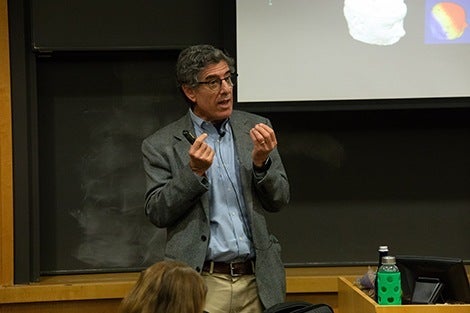‘Training’ your mind to improve well-being

November 6, 2018 – Richard Davidson believes that we all have the ability to cultivate our own well-being—that there are ways to “train” our brains to improve both mental and physical health.
Davidson, founder and director of the Center for Healthy Minds at the University of Wisconsin-Madison, spoke to a standing-room-only crowd in Harvard T.H. Chan School of Public Health’s Room FXB G13 on October 25, 2018, as part of the Lee Kum Sheung Center for Health and Happiness Seminar Series.
Davidson said that his career has been driven by a central question: “Why is it that certain people are more vulnerable to life’s slings and arrows, and others are more resilient? And how can you nudge people along whatever these continua are to promote more resilience and well-being?”
Davidson’s research has been influenced by the Dalai Lama, who urged him to study the sort of meditative practices used in his Buddhist tradition to see whether they could positively impact health—and, if so, to disseminate them widely.
“I am trying to dutifully honor the commitment I made to him to do this work,” said Davidson.
Research has shown that our brains can be shaped over time by both positive and negative experiences and emotions, Davidson said. Meditation practice, even short-term, has been linked with changes in gene expression—the process by which genes encode proteins, which in turn dictate cell function—in ways that could improve health and well-being.
There is also strong evidence that people have a natural propensity toward being good, toward caring for others—and that this propensity can be nurtured over time. “When we do simple meditation practices to cultivate kindness and compassion, we’re not creating those qualities de novo, but rather we are nurturing qualities that may be there from the start,” he said.
Davidson outlined four components of well-being that people can be trained in: awareness, connection, insight, and purpose. Studies have shown that interventions to boost these components are linked with potentially health-promoting changes inside the brain.
Awareness refers to being able to pay attention, to be self-aware, and to be focused. In today’s society, with many of us glued to smartphones all day, “all of us suffer from an attention deficit,” Davidson said. He mentioned a study that found that 47% of American adults are not paying attention to what they’re doing at any given moment, and that people report being less happy when they’re not paying attention. “If your mind is distracted, it exacts a toll on your well-being,” Davidson said.
Connection refers to emotions that underpin successful relationships with others—kindness, empathy, and maintaining a positive outlook. Davidson cited research suggesting that a two-week meditation program focused on compassion can increase people’s warm-heartedness and altruism and change their underlying brain function. In another study, researchers developed a video game to promote pro-social behavior in kids, featuring aliens with realistic facial expressions who need the kids’ help, and in which kids are rewarded for being generous and helpful to the aliens. The study found that, after about two weeks of playing the game, kids showed more “empathic accuracy”—the ability to pick up on the motivations, mindset, and emotions of others.
Insight is defined as having a healthy sense of self, the ability to deflect self-defeating narratives, and to bounce back quickly from adverse events. Davidson said that data from people who have practiced meditation for many years show changes in a key brain circuit involved in emotional regulation—and that these brain changes appear linked with some people’s ability to recover more quickly than others from negative experiences.
Purpose in life—having a clear direction in life and a sense that life has meaning—has also been linked with faster recovery from negative events and even with longer life, Davidson said. He cited a study of people in their 70s and 80s that found that those with less of a sense of purpose in life died earlier in the follow-up period than those who reported having more purpose. “This is a really important quality which we think is critically related to well-being,” he said.
Davidson said his research group is working on an app aimed at cultivating well-being through guided meditation and breathing exercises, along with ways to measure it. Ultimately, though, he hopes such an app will become unnecessary—that people will make cultivating well-being a part of their daily life, like brushing their teeth. “This is a kind of mental hygiene,” he said.
photo: Nilagia McCoy


